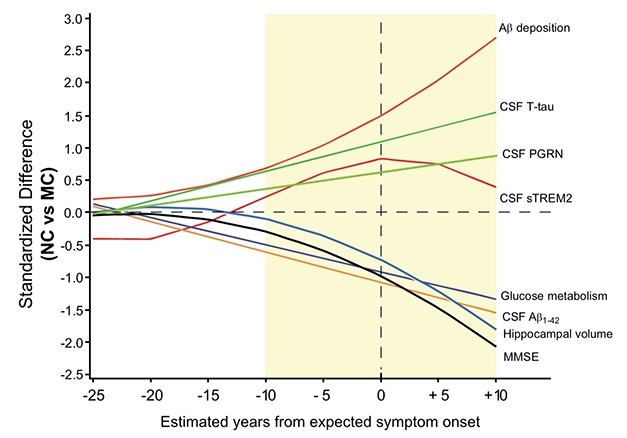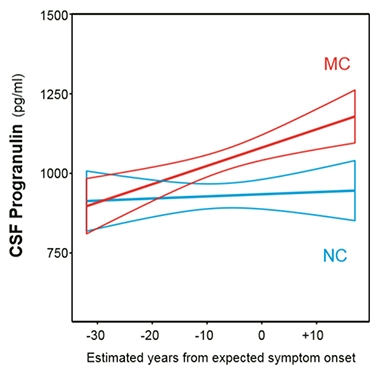Progranulin: A Mark of Worsening Alzheimer’s?
Quick Links
Progranulin, a microglial protein typically associated with frontotemporal dementia, may also play a role in Alzheimer’s. That’s according to a November 27 paper in the EMBO Journal. Scientists led by Christian Haass, Ludwig-Maximilians University, Munich, report that progranulin levels rise in the cerebrospinal fluid as AD progresses, in both its autosomal-dominant (ADAD) and late-onset (LOAD) forms. They suggest that progranulin could help track the activity of microglia in disease.
- CSF progranulin rises as disease progresses in early and late-onset AD.
- In ADAD, the microglial protein rises 10 years before disease; in LOAD, it tracks with cognitive decline.
- Progranulin expression may indicate a microglial response to neurodegeneration.
“This study proves a role of progranulin activation in Alzheimer’s disease neurodegeneration,” said Kristel Sleegers, University of Antwerp, Belgium.
“This is an interesting study that sheds new light on the role of PGRN [progranulin] in AD,” wrote Alberto Lleó, Hospital de la Santa Creu i Sant Pau, Barcelona, Spain, to Alzforum. “It contributes important mechanistic information about the role of microglia in autosomal-dominant and sporadic AD.” Lleo noted that progranulin levels broke away from control levels at different times between the two forms of AD, perhaps reflecting different microglial dynamics. Sleegers and Lleó were not involved in the research.

Progranulin in Context. In this ADAD staging diagram, CSF progranulin creeps up about 10 years before a mutation carrier is expected to develop dementia. [Image courtesy of Suárez-Calvet et al., 2018.]
Progranulin is a protein of largely unknown function, predominantly produced and secreted by microglia. Genetic and functional studies hint that it could play a role in AD, as its depletion heightens Aβ and tau deposition in mice, and its expression rises in microglia surrounding plaques (Minami et al., 2014; Hosokawa et al., 2015; Pereson et al., 2009). However, no study to date has found clear differences in cerebrospinal fluid levels between AD patients and healthy controls (Morenas-Rodríguez et al., 2015; Körtvélyessy et al., 2015).
Previously, Haass and colleagues focused on another microglial protein, TREM2. Its concentration rises in the CSF early in AD and falls later on (Jan 2016 news; Mar 2016 news). What about progranulin?
First author Marc Suárez-Calvet and colleagues examined extensive cross-sectional CSF data from people with ADAD and LOAD. From the Dominantly Inherited Alzheimer’s Disease Network (DIAN), they compared progranulin levels in 130 carriers of PSEN1, PSEN2, or APP mutations with those of 85 of their noncarrier siblings. In carriers, CSF progranulin started to deviate from that of noncarriers 10 years before the expected age of symptom onset (see image below). Levels stayed elevated over control throughout.

DIAN.
Levels of CSF progranulin begin to diverge between mutation carriers (MC) and noncarriers (NC) 10 years before the estimated age of onset. [Image courtesy of Suárez-Calvet et al., 2018.]
In late-onset AD, the progranulin profile looked somewhat different, as demonstrated by CSF from 1,017 people from the Alzheimer’s Disease Neuroimaging Initiative (ADNI). Instead of rising a decade before dementia set in, progranulin was higher only in people with a CDR of one or greater—meaning they already had mild to severe dementia—and only in people with concurrent CSF evidence of phosphorylated and aggregated tau (see image below). People in whom only CSF Aβ was abnormal had levels of progranulin comparable to healthy controls.
CSF progranulin levels correlated with TREM2 in both ADAD and LOAD, but not in healthy controls, suggesting the two markers go hand-in-hand only in the face of neurodegeneration.

ADNI.
Compared with healthy controls (blue), mean CSF progranulin rises once clinical dementia rating scores reach 1. At earlier stages, even when CSF A, tau, and neurodegeneration (A/T/N) markers were positive, progranulin was normal. [Image courtesy of Suárez-Calvet et al., 2018.]
“Progranulin is certainly not a diagnostic marker. The variability is too high, and the differences are too small,” Haass told Alzforum. “But together with TREM2, these are two valuable microglial activity markers.”
Progranulin and TREM2 could help monitor microglial activation states as disease progresses, and evaluate future therapeutics that target neuroinflammation in AD. In unpublished data, Haass found that knocking out TREM2 in microglia has the opposite effect of knocking out PGRN. Without TREM2, microglia got stuck in a resting state; without PGRN, they became hyperactive.
“It’s nice that they show progranulin is a dynamic marker that can help monitor ongoing microglial activation in response to tau pathology and neurodegeneration,” agreed Sleegers. —Gwyneth Dickey Zakaib
References
News Citations
- TREM2 Goes Up in Spinal Fluid in Early Alzheimer’s
- Microglial Marker TREM2 Rises in Early Alzheimer’s and on Western Diet
Paper Citations
- Minami SS, Min SW, Krabbe G, Wang C, Zhou Y, Asgarov R, Li Y, Martens LH, Elia LP, Ward ME, Mucke L, Farese RV Jr, Gan L. Progranulin protects against amyloid β deposition and toxicity in Alzheimer's disease mouse models. Nat Med. 2014 Oct;20(10):1157-64. Epub 2014 Sep 28 PubMed.
- Hosokawa M, Arai T, Masuda-Suzukake M, Kondo H, Matsuwaki T, Nishihara M, Hasegawa M, Akiyama H. Progranulin reduction is associated with increased tau phosphorylation in P301L tau transgenic mice. J Neuropathol Exp Neurol. 2015 Feb;74(2):158-65. PubMed.
- Pereson S, Wils H, Kleinberger G, McGowan E, Vandewoestyne M, Van Broeck B, Joris G, Cuijt I, Deforce D, Hutton M, Van Broeckhoven C, Kumar-Singh S. Progranulin expression correlates with dense-core amyloid plaque burden in Alzheimer disease mouse models. J Pathol. 2009 Oct;219(2):173-81. PubMed.
- Morenas-Rodríguez E, Cervera-Carles L, Vilaplana E, Alcolea D, Carmona-Iragui M, Dols-Icardo O, Ribosa-Nogué R, Muñoz-Llahuna L, Sala I, Belén Sánchez-Saudinós M, Blesa R, Clarimón J, Fortea J, Lleó A. Progranulin Protein Levels in Cerebrospinal Fluid in Primary Neurodegenerative Dementias. J Alzheimers Dis. 2015;50(2):539-46. PubMed.
- Körtvélyessy P, Gukasjan A, Sweeny-Reed C, Heinze HJ, Thurner L, Bittner DM. Progranulin and Amyloid-β Levels: Relationship to Neuropsychology in Frontotemporal and Alzheimer's Disease. J Alzheimers Dis. 2015 Mar 16; PubMed.
Further Reading
Papers
- Cooper YA, Nachun D, Dokuru D, Yang Z, Karydas AM, Serrero G, Yue B, Alzheimer's Disease Neuroimaging Initiative, Boxer AL, Miller BL, Coppola G. Progranulin levels in blood in Alzheimer's disease and mild cognitive impairment. Ann Clin Transl Neurol. 2018 May;5(5):616-629. Epub 2018 Apr 2 PubMed.
- Paushter DH, Du H, Feng T, Hu F. The lysosomal function of progranulin, a guardian against neurodegeneration. Acta Neuropathol. 2018 Jul;136(1):1-17. Epub 2018 May 9 PubMed.
Primary Papers
- Suárez-Calvet M, Capell A, Araque Caballero MÁ, Morenas-Rodríguez E, Fellerer K, Franzmeier N, Kleinberger G, Eren E, Deming Y, Piccio L, Karch CM, Cruchaga C, Paumier K, Bateman RJ, Fagan AM, Morris JC, Levin J, Danek A, Jucker M, Masters CL, Rossor MN, Ringman JM, Shaw LM, Trojanowski JQ, Weiner M, Ewers M, Haass C, Dominantly Inherited Alzheimer Network, Alzheimer's Disease Neuroimaging Initiative. CSF progranulin increases in the course of Alzheimer's disease and is associated with sTREM2, neurodegeneration and cognitive decline. EMBO Mol Med. 2018 Dec;10(12) PubMed.
Annotate
To make an annotation you must Login or Register.

Comments
No Available Comments
Make a Comment
To make a comment you must login or register.